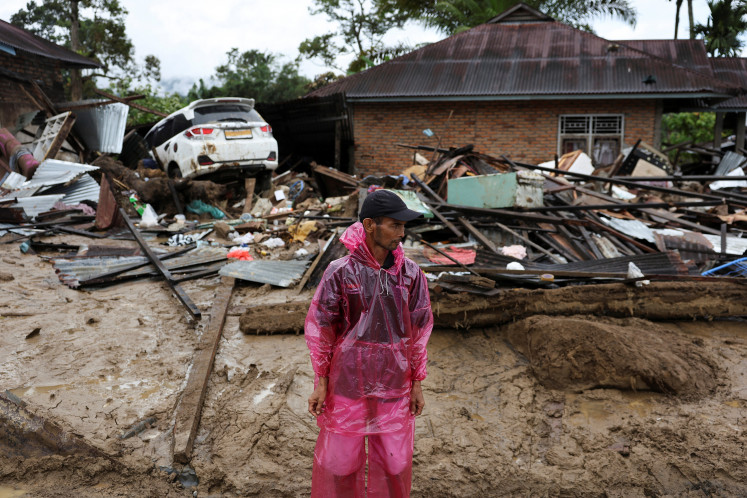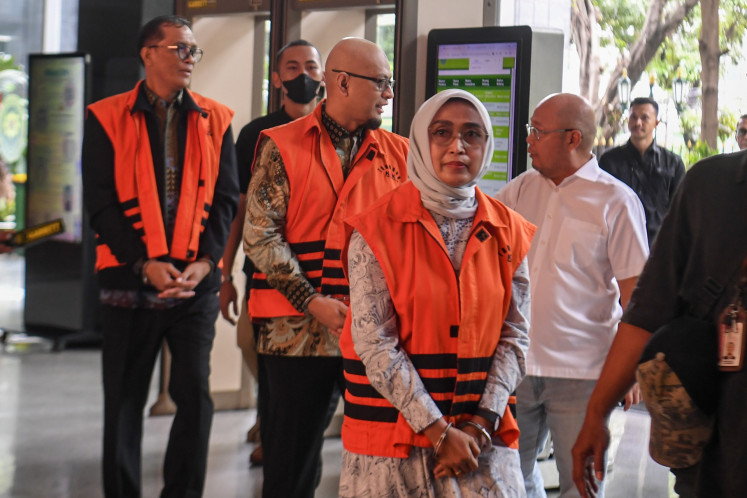Popular Reads
Top Results
Can't find what you're looking for?
View all search resultsPopular Reads
Top Results
Can't find what you're looking for?
View all search resultsAnalysis: China’s bird flu impact: Nothing to sneeze at
Following six people having died (four in Shanghai and two in Hangzhou) of the deadly H7N9 strain of avian influenza, two more cases have emerged in Shanghai, bringing the total number of human infections to 18
Change text size
Gift Premium Articles
to Anyone
F
ollowing six people having died (four in Shanghai and two in Hangzhou) of the deadly H7N9 strain of avian influenza, two more cases have emerged in Shanghai, bringing the total number of human infections to 18.
In Hangzhou and Nanjing, where people either have died and/or been diagnosed with the virus, poultry trades were held in abeyance and thousands of birds seized. In Shanghai, all poultry markets have been closed with more than 20 thousand birds killed thus far while live poultry from other parts of China not allowed entry.
There are now concerns that this bird flu, which is deemed much more serious than previous cases, may spark an epidemic, further dragging down China’s economic growth. In 2003, China’s GDP growth contracted by 0.5 percent due to outbreak of Severe Acute Respiratory Syndrome (SARS). With current outbreak possibly having a serious repercussion not only on China but also the rest of the region, we analyze its impact on the Indonesian market.
Looking back, the 2003 SARS had a clear and adverse impact on the Indonesian economy (exhibit 1) with GDP growth started to weaken in 3Q and lasted for three quarters before a gradual recovery in 2Q04. With that said, the current development in China’s avian flu is worth watching and is undoubtedly nothing to sneeze at.
Our analysis of this situation suggests that air travel will be the worst impacted sector with Garuda (GIAA) likely to suffer. According to the top management of GIAA there are 19 international destinations, of which four are to Beijing (five times a week), Shanghai (daily), Guangzhou (daily) and Hong Kong (two times daily).
This translates to about 15 percent of total international ASK (Available Seat Kilometer), of which Hong Kong contributes to approximately 40 percent of travels to China. International accounts for 45 percent of GIAA’s total scheduled-flight revenue.
Our sensitivity analysis reveals that every 10 percent drop in travels to greater China would result in 0.9 percent drop in GIAA’s total consolidated 2013 revenues and 3.1 percent decline in bottom line.
However, we note that based on past experiences, adverse impact from such epidemics tends to be short-term in nature while ensuing pent-up demand is likely to be strong. Thus, we recommend investors to collect GIAA shares assuming a severe knee-jerk reaction stemming from this bird-flu outbreak. It is worth highlighting that confirmed human infections have been isolated with no sign of human-to-human transmission thus far.
With air travel disruption, other transportation industry like the taxi business will also be adversely impacted. Given possible slowdown in China’s economy due to this bird flu epidemic, we are of the view that most commodity plays will perform poorly with the exception of gold and CPO due to their more defensive nature.
We expect lower oil prices to worsen, which is currently already below US$93 per barrel to drag down metals as well as coal prices. This is bad news for AKR Corp’s earnings. It is also possible that Indonesia could see increased steel dumping from China — bad for both Krakatau Steel (KRAS) and Pelat Timah Nusantara (NIKL).
For retailers, Ace Hardware (ACES) and Ramayana (RALS) could experience supply disruptions, although the later could also benefit from less competition from cheap Chinese imports. Finally, contagion fear could see lower chicken consumption in Indonesia, negatively impacting Charoen Pokphand (CPIN), Japfa Comfeed (JPFA) and Malindo Feedmill (MAIN).
On a more positive note, we expect sentiment on pharmaceutical counters to be buoyant as consumers take health supplements to boost body resistance against the flu virus. With less air travel, people and businesses must resort to increased phone/data usage in order to communicate.
Less regional travels will mean greater domestic shopping for Indonesia’s middle-up consumers to the benefit of Mitra Adiperkasa (MAPI). Finally, with the prospect of lower coal prices due to China’s economic slowdown, cement players will benefit from lower production costs as coal accounts some 20 percent of total costs of goods sold.
The writer is senior associate director/head of research at PT Bahana Securities.










